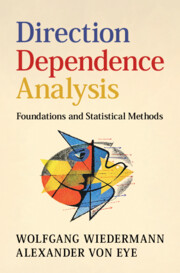Book contents
- Direction Dependence Analysis
- Direction Dependence Analysis
- Copyright page
- Contents
- Preface
- Chapter 1 Introduction
- Chapter 2 The Linear Regression Model
- Chapter 3 Asymmetry Properties of Distributions of Observed Variables
- Chapter 4 Asymmetry Properties of Error Distributions
- Chapter 5 Independence Properties of Causes and Errors
- Chapter 6 Direction of Dependence under Latent Confounding
- Chapter 7 The Integrated Framework of Direction Dependence Analysis
- Chapter 8 Stability and Sensitivity Analyses
- Chapter 9 Extensions and Applications
- Chapter 10 Statistical Software
- Chapter 11 Concluding Remarks
- References
- Index
Chapter 8 - Stability and Sensitivity Analyses
Published online by Cambridge University Press: 16 September 2025
- Direction Dependence Analysis
- Direction Dependence Analysis
- Copyright page
- Contents
- Preface
- Chapter 1 Introduction
- Chapter 2 The Linear Regression Model
- Chapter 3 Asymmetry Properties of Distributions of Observed Variables
- Chapter 4 Asymmetry Properties of Error Distributions
- Chapter 5 Independence Properties of Causes and Errors
- Chapter 6 Direction of Dependence under Latent Confounding
- Chapter 7 The Integrated Framework of Direction Dependence Analysis
- Chapter 8 Stability and Sensitivity Analyses
- Chapter 9 Extensions and Applications
- Chapter 10 Statistical Software
- Chapter 11 Concluding Remarks
- References
- Index
Summary
Chapter 8 focuses on statistical approaches to evaluate and quantify the stability and sensitivity of causal model selection. Stability analysis addresses questions concerning the robustness of DDA results against sample composition. DDA model selection can be considered robust when causal decisions are stable across replicates of the initial data. In contrast, DDA statistics can be expected to show considerable variability, when outliers and overly influential observations contaminate the data. Sensitivity analysis focuses on the robustness of DDA against hidden external influences. A Monte-Carlo based sensitivity algorithm is introduced that can be used to test the sensitivity of DDA against artificially induced hidden confounding. While robust causal models can be expected to be fairly immune against additional hidden confounding, competing causal models that are already affected by latent external factors tend to become indistinguishable even when a small amount of external confounding is added to the data. Simulated and real-world data examples are presented to illustrate stability and sensitivity approaches in the context of probing the causal direction of effects.
Information
- Type
- Chapter
- Information
- Direction Dependence AnalysisFoundations and Statistical Methods, pp. 237 - 254Publisher: Cambridge University PressPrint publication year: 2025
Accessibility standard: WCAG 2.2 AAA
Why this information is here
This section outlines the accessibility features of this content - including support for screen readers, full keyboard navigation and high-contrast display options. This may not be relevant for you.Accessibility Information
Content Navigation
Allows you to navigate directly to chapters, sections, or non‐text items through a linked table of contents, reducing the need for extensive scrolling.
Provides an interactive index, letting you go straight to where a term or subject appears in the text without manual searching.
Reading Order & Textual Equivalents
You will encounter all content (including footnotes, captions, etc.) in a clear, sequential flow, making it easier to follow with assistive tools like screen readers.
You get concise descriptions (for images, charts, or media clips), ensuring you do not miss crucial information when visual or audio elements are not accessible.
You get more than just short alt text: you have comprehensive text equivalents, transcripts, captions, or audio descriptions for substantial non‐text content, which is especially helpful for complex visuals or multimedia.
Visual Accessibility
You will still understand key ideas or prompts without relying solely on colour, which is especially helpful if you have colour vision deficiencies.
You benefit from high‐contrast text, which improves legibility if you have low vision or if you are reading in less‐than‐ideal lighting conditions.
